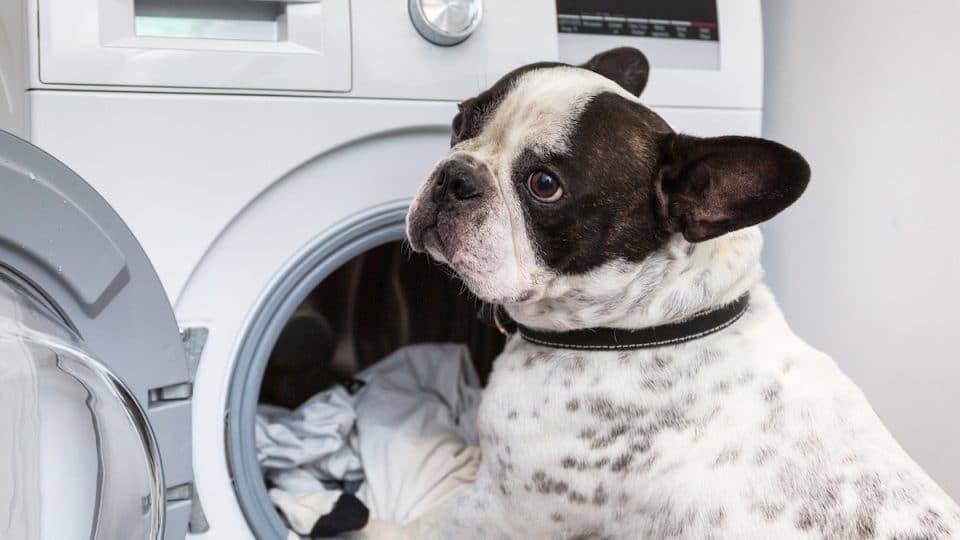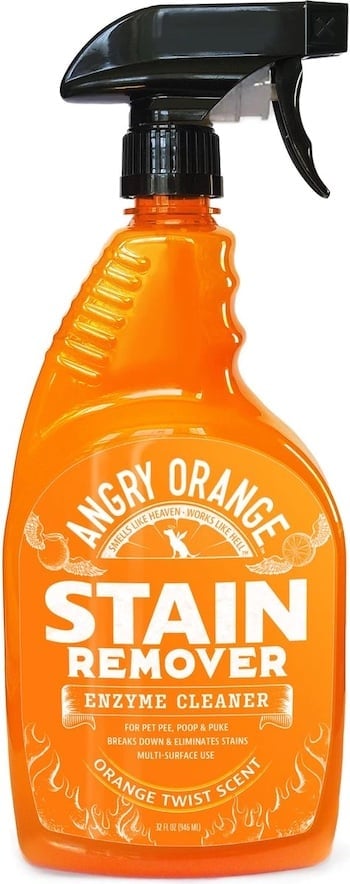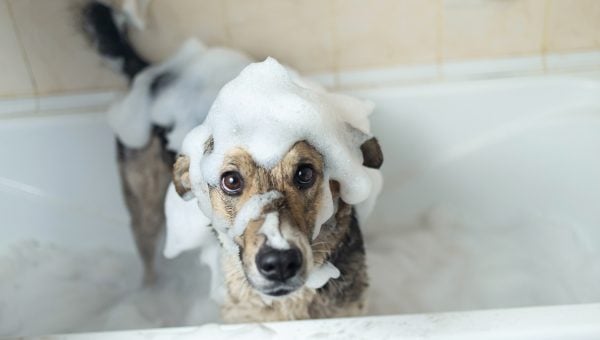- This post contains affiliate links. Read more here.
- Not a substitute for professional veterinary help.
If you share your home with a pet, you’re probably aware that “spring cleaning” is more accurately called “all-year-cleaning.” (Not that we’re complaining.)
Whether you have a new puppy who gets into everything or a cat who likes to lick freshly cleaned windows, they’re bound to make contact with the cleaning supplies in your home at some point. And since many household cleaners contain questionable ingredients known to cause respiratory, skin, and/or GI issues in humans as well as animals, pet-safe cleaning products are definitely worth exploring.
To learn more, we consulted Dr. Chyrle Bonk, DVM, a veterinarian at Senior Tail Waggers. Continue reading for details on how to identify pet-safe cleaning products, what hazardous ingredients to avoid, and general safety guidelines when it comes to cleaning with pets in the home.
How Harmful Cleaning Ingredients Affect Pets
Unfortunately, the hazardous chemicals found in many commercial cleaners can have a stronger effect on our pets simply because of their shorter stature. Our cats’ and dogs’ bodies are closer to the ground—meaning they’re breathing in more of that floor cleaner than we are.
Our pets also sleep on the floor, lick the floor, and their bare paw pads can absorb toxins through the floor as well. Plus, curious canines (and some cats) have been known to sample liquid cleaning products that are left out.
Because cats and dogs are much smaller than humans, they are at greater risk of toxic poisoning. Cats, in particular, are at high risk because of their small size and the fact they lick and groom their fur so much. They also lack certain liver enzymes, so their bodies can’t handle toxins as well as humans or even dogs.

mgstudyo via iStock
Cleaning products to avoid around pets
“Bleach and ammonia are a couple of common household cleaners that can be hazardous to pets,” Dr. Chyrle Bonk tells Rover. “Avoid using them in your pet areas, and use ventilation when you use them anywhere else in your home.”
In addition to bleach, avoid the following cleaning ingredients around pets:
- Phenols: This corrosive chemical can hurt the skin and eyes. If inhaled, phenols can injure the lungs.
- Phthalates: Chemicals used to add fragrance.
- Ammonia-based cleaners: Ammonia mimics the scent of cat urine, so it may encourage inappropriate urination outside the litter box.
- Rubbing alcohol: Can cause low blood sugar, stomach upset, slow heart rate, low blood pressure, and difficulty breathing.
- Certain essential oils: Some essential oils are pet-safe (like lavender and peppermint), but others like tea tree oil and citrus are harmful to pets.
- Formaldehyde
- Chlorine
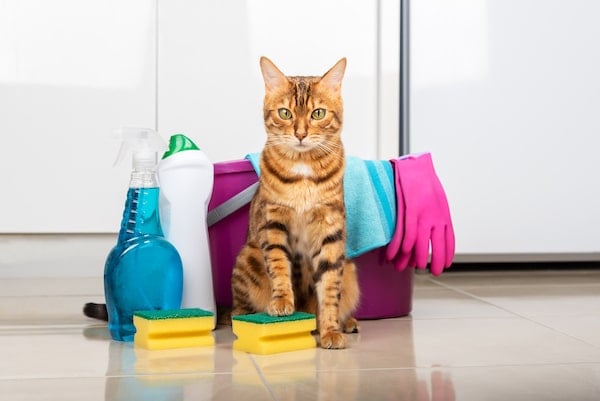
Svetlana Sultanaeva via iStock
According to Dr. Bonk, if your pet inhales any of these ingredients, it may cause issues with their nose, mouth, or eyes. “Some cleaners can irritate the respiratory tract, which can lead to coughing, sneezing, nasal and eye discharge. If severe enough, these cleaners can cause real damage that may lead to secondary infections,” she says.
If your pet gets a mouthful of a toxic cleaner, GI issues can follow. “Other cleaners can cause digestive issues if ingested,” Bonk says. “These may lead to vomiting, diarrhea and not eating. Some cleaners can even be fatal.” If you suspect poisoning, don’t hesitate to call your veterinarian right away.
Additional side effects to watch for include:
- Rash or burns on the skin
- Lethargy
- Breathing problems
- Seizures
How To Know If Cleaning Products are Safe for Your Pet
Fortunately, plenty of cleaners exist that are pet-friendly and actually work. Your first check should be the label, according to Dr. Bonk.
Be on the lookout for telltale words like “flammable,” “corrosive,” “danger,” and “warning,” and stay away. Consumers should even approach brands labeled as “All Natural” or “Holistic” with a healthy degree of caution, as these misnomers often amount to nothing more than strategic marketing language. If a product claims to be safe and natural, check the rest of the ingredients to be sure there’s nothing harmful in it.
“Natural” Pet-Safe Cleaning Products
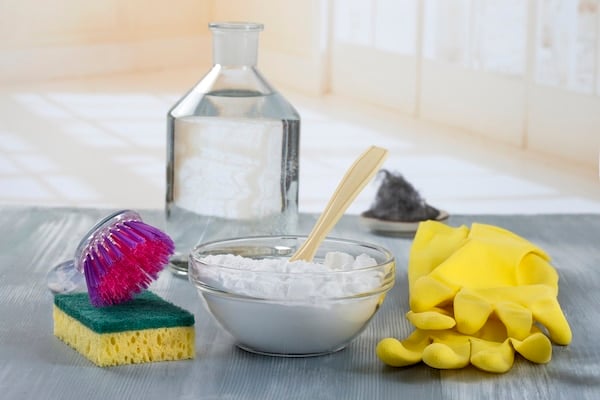
JPC-PROD via iStock
Many experts, including Dr. Bonk, point to vinegar and baking soda as two natural cleaning products that are safe to use around pets. Baking soda not only possesses natural odor-absorbing powers, but it also makes a great stain remover and general cleaner. Combine it with water to make a paste, or vinegar for extra fizzy cleaning power.
Along with baking soda, vinegar is a classic non-toxic cleaning product that effectively cleans up a whole host of pet messes. Use it alone or combine it with baking soda and lemon for a fizzy, citrusy, pet-safe scrub.
While they’re certainly a safe route to take, it’s worth noting that natural products probably won’t be as effective as commercial enzyme-based cleaners—and they’ll require slightly more effort to use. On the upside, vinegar and baking soda are both super affordable, and plenty of pet parents swear by them.
Pet-Safe Enzymatic Cleaners
Enzymatic cleaners are pet-safe, incredibly effective, and widely recommended by veterinary and cleaning professionals for all kinds of pet messes. These cleaners break down organic pet accidents, and they’re the easiest way to tackle pet urine, feces, and vomit.
For a good enzyme cleaner, Dr. Bonk recommends Rocco and Roxie Stain and Odor Eliminator, and Angry Orange, which can both be used on carpets, wood floors, litter boxes, kennels, carriers, and furniture. Cleaning experts and pet parents also frequently cite success with Nature’s Miracle and Skout’s Honor.
Best Safety Practices for Cleaning with Pets
When using pet-safe products, pet parents still need to take proper precautions, Dr. Bonk tells us. Even natural remedies like vinegar and baking soda require care, as they can cause stomach upset and oral irritation if swallowed by your pet.
“Always read the label and follow the instructions carefully,” she says. “This is especially important when pertaining to diluting the product or what ventilation or other safety precautions are needed.”
“Try to have your pet out of the area you are cleaning, ensure proper ventilation, and thoroughly rinse all buckets and utensils that you use,” Bonk advises. She also recommends storing any cleaning products (pet-safe and otherwise) in a lockable cabinet or high enough to be out of your pet’s reach.
Additional safety practices for pet parents to follow:
- Make sure all surfaces are dry before your pet returns to the area
- Read cleaner labels to check ingredients
- Follow all the instructions for your chosen cleaner
- Follow recommendations for diluting products (using more isn’t better)
- Ensure garbage cans have secured lids
How We Chose
The cleaning products featured here were selected based on a combination of our own hands-on testing, a comprehensive look at customer reviews, and an interview with veterinarian Chryle Bonk, DVM.
We prioritized cleaners with pet-safe ingredients and effective results. Additionally, we considered different pet parent lifestyles and cleaning goals. We’re also guided by the experience of living and playing alongside our own much-loved and strongly opinionated pets, who are never stingy with their feedback.
